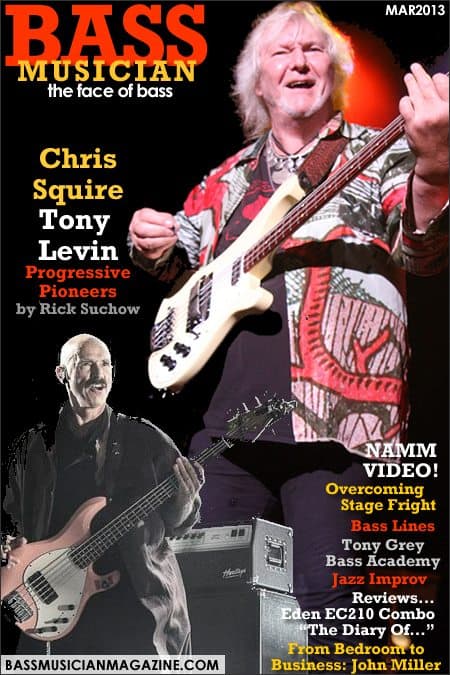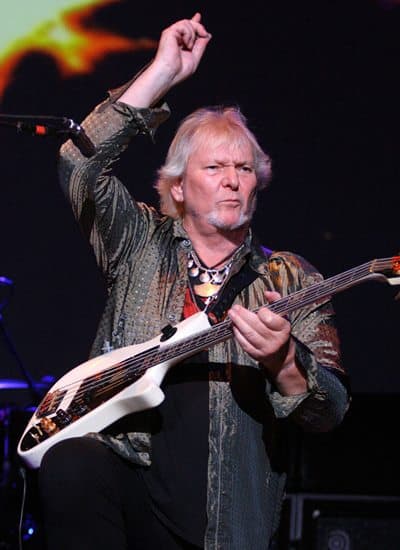 I’m not really sure when the term “progressive rock” came to be, or for that matter, the more user-friendly “prog-rock”. Back in the day,when Yes first landed on everyone’s musical radar, the only term I recall using was “holy shit”. The band unleashed a ferocious series of albums the likes of which I’d never quite experienced before, and although there were other groups of that era working the new genre– King Crimson and Emerson, Lake & Palmer, to name two– Yes seemed to posses some extra, other-worldly dimension. What exactly it was, though, was not easy to define. Was it Steve Howe’s unique approach to guitar? Jon Anderson’s identifiable voice, or his pieces-of-a-puzzle lyrics? Was it Roger Dean’s artwork, with visual landscapes that took us to fragile planets, topographic oceans and closer to the edge? Perhaps at the end of the day, and certainly at its core, that extra dimension was the sound of Chris Squire on bass.
I’m not really sure when the term “progressive rock” came to be, or for that matter, the more user-friendly “prog-rock”. Back in the day,when Yes first landed on everyone’s musical radar, the only term I recall using was “holy shit”. The band unleashed a ferocious series of albums the likes of which I’d never quite experienced before, and although there were other groups of that era working the new genre– King Crimson and Emerson, Lake & Palmer, to name two– Yes seemed to posses some extra, other-worldly dimension. What exactly it was, though, was not easy to define. Was it Steve Howe’s unique approach to guitar? Jon Anderson’s identifiable voice, or his pieces-of-a-puzzle lyrics? Was it Roger Dean’s artwork, with visual landscapes that took us to fragile planets, topographic oceans and closer to the edge? Perhaps at the end of the day, and certainly at its core, that extra dimension was the sound of Chris Squire on bass.
With a biting Rickenbacker 4001 upfront in the mix, playing angular, syncopated and surprise-ready bass lines, Squire took bassists to uncharted territory in the 70′s with Yes. Songs like “Yours Is No Disgrace”, “Siberian Khatru” and the 18-minute opus “Close To The Edge” were bass anthems in their own right, and those toiling in the low-end game were suddenly scurrying to their turntables and tape decks to figure out what the hell Chris was doing, and could they possibly do it themselves. Progressive rock? Probably. Progressive bass? Absolutely.
 Okay, so let’s fast-forward about forty years to the present. After nearly 20 personnel changes and as many albums, Yes carries on. Chris is not only still the group’s anchor, but the only member to be there for the whole damn trip. Every record, every tour, every show… all of it. As others left the fold, returned to the fold, left again, sought out solo careers, other bands, and even other careers, the band’s name seemed to stretch from “Yes” to “Yes, but“. All except Squire, that is. To this day he remains steadfast, eyes on the bigger picture, staying the course. For him Yes is a still-unfolding journey, one that began a long time ago and rolls on into the future.
Okay, so let’s fast-forward about forty years to the present. After nearly 20 personnel changes and as many albums, Yes carries on. Chris is not only still the group’s anchor, but the only member to be there for the whole damn trip. Every record, every tour, every show… all of it. As others left the fold, returned to the fold, left again, sought out solo careers, other bands, and even other careers, the band’s name seemed to stretch from “Yes” to “Yes, but“. All except Squire, that is. To this day he remains steadfast, eyes on the bigger picture, staying the course. For him Yes is a still-unfolding journey, one that began a long time ago and rolls on into the future.
This year is shaping up to be one of Yes’ more notable chapters, as they revisit those massively successful early days with a tour that kicks off today and features the band performing three of their classic albums in their entirety. It’s a format they haven’t done in over 30 years, and fans will be treated to The Yes Album, Close To The Edge, and Going For The Oneplayed in full, start to finish, just as they were heard when originally released in the age of vinyl. Some of the faces have changed from those who actually crafted those recordings; Jon Anderson is replaced by his younger clone Jon Davison (check him out on YouTube), and Geoff Downes is on hand for the keyboard parts originally played by Tony Kaye and Rick Wakeman. But Steve Howe is still aboard, as is drummer Alan White, who joined Yes in 1972, replacing Bill Bruford after Close To The Edge.
I caught up with Chris earlier this year, just weeks before he and the band were gearing up for mid-February rehearsals in Los Angeles. Oh yeah, if you’ve noticed that he has a tendency to not smile for the camera, be assured: the big man is full of laughs, fun to talk with, and exudes positive energy worthy of, well… a band name like Yes.
Read on...
YES AT GONZO
YES AT GONZO
| Union (Standard DVD) DVD - £9.99 |
| Union (2CD) 2CD - £7.99 |
| Rock Of The 70's DVD - £12.99 |
| The Lost Broadcasts DVD - £7.99 |
| Rock of the 70s DVD - £9.99 |


No comments:
Post a Comment